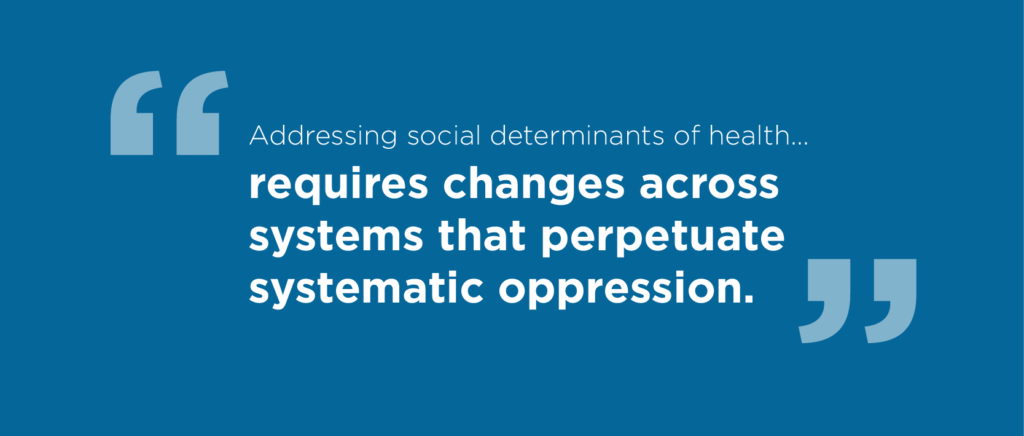June 16, 2020
Health Sector Statement on Racialized Violence, Chemical Irritants, and Trauma-Informed Practices

As healthcare providers, it is our mission to support the health and well-being of all community members, but more specifically for those that have historically lacked access to comprehensive healthcare. Historically, Black, Indigenous, and people of color (BIPOC) have been locked out of their rights to healthcare. Community-based health centers and federally qualified health centers are committed to addressing social determinants of health, equitable access, whole person and population-based health. The demonstrations of the last couple of weeks led by BIPOC communities and joined by allies have highlighted the health-related impacts of racialized violence, chemical irritants and traumatic responses to policing policies.
We call on all members of the healthcare sector to acknowledge and educate non-healthcare sectors of these critical intersections and ask our leaders to consider changes in practice and policies to better support whole person and population health.
Addressing social determinants of health is the responsibility of the healthcare sector, but it requires changes across systems that perpetuate systematic oppression.
Failure to address the social determinants of health (SDoH) has caused profound health inequities in our country. These social determinants are the manifestation of decades of racialized violence and institutionalized oppression of BIPOC communities. We cannot fully address these issues if our housing, education, public safety and healthcare systems continue to perpetuate systemic racism.
The demonstrations happening across the nation, and now across the world, are calling out to our health, housing and economic systems to radically change the status quo. Through this change, we can move our work on SDoH forward and begin to correct the structural inequities that have been perpetuated for generations within the United States.
Whole health care directly improves health and racial equity.
We know that we can make real inroads to improving health and racial equity by providing integrated care within a behavioral healthcare setting as a Certified Community Behavioral Health Clinic (CCBHC). Our approach as a CCBHC has been tremendously helpful for the individuals we serve and the broader healthcare system in a number of ways, such as reducing emergency department utilization and medical admissions for a large set of our clients, as well as significantly reducing Hemoglobin A1C values for a group of individuals with co-occurring mental health diagnoses and diabetes. These have direct effects on health equity.
Integrated/ whole health care provides critical access and our team can more readily care for individuals and communities considered high risk for COVID-19. These are the same communities where health and, more specifically, racial inequity continue to exist.
COVID-19 is disproportionately affecting communities of color, accounting for 43% of all confirmed cases in the Portland Metro Region. The opportunity that the CCBHC program presents to reduce inequities cannot be emphasized enough. There remains widespread lack of access to meaningful, culturally relevant, trauma-informed resources and care for BIPOC communities.
Policing practices should adhere to public health-related guidance before deploying devices that exacerbate illness, especially in the times of this COVID pandemic.
The use of crowd-dispersing chemicals like tear gas and pepper spray cause multiple health effects for every person exposed. These include mucus membrane irritation of the eyes, nose, throat and airways. Exposure to these agents is physically painful and traumatizing. In heavier exposures, these chemicals will cause inflammation in the lungs, damage to the membranes and constriction of airways.
Repeated exposures will have a compounding effect on both chronic and acute respiratory illnesses. These conditions include COPD, chronic bronchitis and acute infections like influenza, bacterial pneumonia and COVID-19. These chemical irritants induce coughing which releases respiratory droplets, directly creating a higher risk of spreading infectious illnesses, and could accelerate the spread of like COVID-19.
Many protesters are responsibly wearing masks as recommended for being out in public where physical distancing is difficult and the choice to use chemical irritants that attack the respiratory system directly counteracts the responsible public health safety steps of demonstrators.
Policing practices should adhere to behavioral health-related guidance to avoid repeat trauma of communities, especially those who are already impacted by past trauma.
Trauma-informed care requires that we create heightened awareness of events, actions and words that can trigger trauma responses in our patients. The use of “crowd control” mechanisms like flashbangs is showing to cause distress in the people we care for, even when they are not actively involved in demonstrations. For those who are part of demonstrations, police should be aware that triggering a trauma response makes it extremely difficult for someone to comply with any directions, verbal or otherwise. In other words, by using “crowd control” mechanisms that illicit trauma responses it will increase the risk of harm and breakdowns in communication.
We look forward to supporting our public agencies to improve policies and practices in order to achieve greater personal and population health with BIPOC communities.
